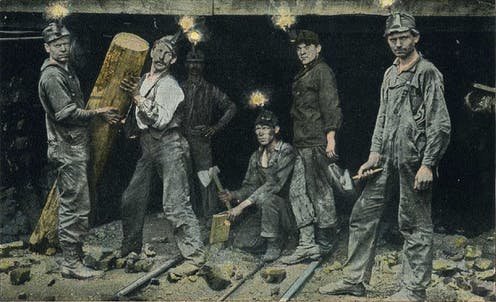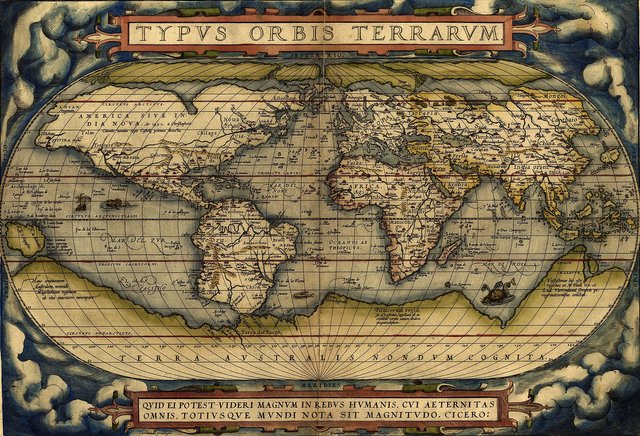Coal, Colonies and Continents: Why the Industrial Revolution began in Britain.
In this essay I aim to outline the key arguments as to why Britain was such a powder keg for initiating the Industrial Revolution, and as to why other societies did not lead the charge. The salient points that shall be discussed include the geographical endowments of Britain which include its access to major trade routes and its access to coal, a relatively inexpensive but powerful source of energy. Another factor was the establishment of overseas colonies far larger than Britain and the resulting commandeering of more calories, raw materials and trade goods than Britain could ever produce within its own borders. My final point will focus upon a country that was equivalent to Britain, The Netherlands, and explain why they did not lead the industrial revolution.

Firstly, some explanation must be put forward as to why the Industrial Revolution was as significant as it was, looking at most of human history prior to it, every dynasty, empire and kingdom was subject to its own population growth and henceforth subject to the Malthusian Trap. (Clark, 2007, 5.) The Malthusian Trap I refer to is the theory of the English scholar Thomas Robert Malthus, where in his magnum opus, An Essay on the Principle of Population, he describes the ‘Iron Law of Population’. This law stated that any improvement whether in food supply or technological invention that lead to a better standard of living would be soon rendered obsolete as the corresponding increase in population following it would drive people back to subsistence level survival. (Malthus, 1798, 4.) Despite whatever decadence the elites of previous civilisations had enjoyed, the majority lived precariously on a balance of subsistence that had always threatened to curtail their number should the population become unmanageable. (ibid., 5.) This therefore heightens the significance of the Industrial Revolution, as it becomes the first time in the existence of humanity, where ‘Man’s long sojourn in the Malthusian world ended.’ (Clark, 2007, 193.)
The first argument I propose as to why Britain lead the Industrial Revolution, one only must scratch the surface for the is the vast reserves of coal available to the British at the time, who were practically living atop a mountain of coal. The American Professor Kenneth Pomeranz highlights this striking difference in the accessibility of coal by contrasting the struggles of the relatively similar conditions of income and survival of the Chinese peasantry in the Yangzi Delta with living conditions in Europe. (Pomeranz, 2002, 428.) The most salient contrast lay not only in the prevalence of coal, proximity to industry was also a governing factor. In England it existed in ‘Huge coal seams… relatively close to London.’ Compared to the ‘Several hundred landlocked miles’ that separated the best coal deposits in China from the centre of industry that was the Yangtze Delta. (ibid., 437.) It is clear to see from the vast difficulties put in place by geography, England was blessed with geographical endowments regarding a highly exploitable energy source, which could be used to fuel steam engines and mills that would lead to higher levels of production far greater than anything produced by human power alone. (Allen, 2011, 368.) China on the other hand was cursed with an insurmountable barrier to the potential source of energy, without that there could be no industrialisation. This was but one feature as to why only Britain could lead the Industrial Revolution.

Another factor comes into play when we look at Britain’s geographical position. It is an island that is relatively close to Europe, therefore ensuring access to her markets, and Britain’s proximity to the Atlantic Ocean enabled it to trade with Africa, Asia and the Americas as well. (Acemoglu, Johnson & Robinson, 2005, 546.) The proximity to the ocean gave Britain an advantage over the nations of Europe such as Italy or Greece who could not access the Atlantic Ocean easily, leading to stunted economic growth as they could not partake in the lucrative practices of slavery, colonization and Atlantic trade. (ibid., 550.)

These geographical factors that lead to Britain’s Industrial Revolution highlight the dependency of this thesis on geographical determinism, a controversial area of study which causes a schism among geographers. Strong criticism has been levelled at this viewpoint however, where it has been enforced with the normative assumption in play that humanity acts as a passive partner in the relationship with their environment. (Franck, 1984, 429.) It has been further stated that geographical determinism is ‘an exaggeration of admittedly valuable insights.’ (Schaefer, 1953, 247.) This does not invalidate the argument, as geography is not the sole defining factor of why Britain became the first nation to industrialise. Institutions and culture also played key roles, and despite the multitude of factors at play, without any one of this key points Britain would have not been able to industrialise.
Another key feature of Britain’s industrialisation was the establishment of colonies in the Americas allowed for a small island nation to acquire more calories and raw materials than it could ever hope to provide for itself using the square meters of land that it had available. As mentioned by the author Matt Ridley, ‘The acres they needed … kept on materialising elsewhere.’ (Ridley, 2010, 201.) Britain essentially escaped the Malthusian Trap through two ways, through usage of these ‘ghost acres’ provided through colonisation, and to a lesser extent the supply lines from the Americans allowed for emigration to the colonies that would ‘reduce the Malthusian pressure of the population boom induced by industrialisation.’ (ibid., 202.) Regarding the ‘ghost acres’, these were essentially units of land that Britain did not physically have, yet utilised the resources grown there to support its growing population and industry. (Pomeranz, 2000, 275.) Had Britain not colonised these areas such as the vast American plains, Britain would have surely fell back into the iron jaws of the Malthusian Trap.

The period of the Enlightenment ushered in a new cultural era across Europe, one that began to base reason not within the grounds of faith, but within real empirical data that could be measured, analysed and replicated with certainty, forming the basis for the scientific method. (Evans & Rydén, 2006, 2.) This ‘Long 18th Century’ was significant as it laid the foundations for the dissemination of ideas and the provision of knowledge about the natural world and the physics that govern it into results that technologists could exploit. In relation to Britain, one can observe the rise in literacy and numeracy rates and equate it with the higher real wages available to workers and their increased propensity to buy education than those elsewhere. (Allen, 2011, 358.) This in turn relates to the presence of high real wage that existed in Britain compared to other parts of Europe and Asia which also de-incentivised factory owners from keeping many labourers especially as capital such as steam engines and spinning jennies had become so much more affordable and cost effective than paid labourers. (ibid., 359.)

Institutions also played a key role, in regards to countries such as Spain, France and Portugal, which were by no means unhindered in access to the Atlantic Ocean, suffered from absolutist institutions that crippled free trade and only allowed a select few merchants that were royally appointed to make an economic rent on Atlantic trade. This kept the countries’ profits far lower than that of anti-absolutist nations such as Britain and the Netherlands. In these countries the shift of power had flowed from the monarchy to the merchants, and political institutions arose that protected the merchants from royal influence. This was but another factor that contributed to Britain’s economic growth, and through such formed the economic backbone for the Industrial Revolution. (Acemoglu et al., 2005, 562.)

Despite the similar structure of the Netherlands and Britain as non-absolutist countries where the monarchy was kept in check and business was far removed from the whims of the aristocracy, it was the economically poorer Britain who overtook the Netherlands in terms of industrial development. (Mokyr, 2000, 508.) Despite the higher levels of literacy and market oriented agricultural sectors of Dutch society, the Dutch suffered from instability due to their subjugation by France and the resulting indemnity required of ‘230 million guilders’, leading to a ‘brain drain’ of skilled craftsmen from the Dutch economy, and therefore hindering the level of industrialisation. (ibid., 509.) Therefore, Britain’s position as an island, which could be well defended and could only be reached by ship, protected it to a greater degree from the French and their predatory governance. (ibid., 511.) Furthermore, the Netherlands was lacking a strong institutional push for functional technology and praised ‘studies on the secret of beauty’, which highlights that although the Netherlands may have shared similar features with Britain, such as scientific institutions, without the other factors, such as the cultural drive for technology, the Netherlands would have never been able to industrialise before Britain. (ibid., 513.)
In conclusion, we can see that factors ranging from geographical endowment, such as the provisions of coal or the geographic position that Britain held, to the cultural background of Britain, institutions that supported the merchant class and education, laid the foundations for the Industrial Revolution. The consequences of this rise to power lead to the establishment and dominance of the British Empire across the globe, as well as Britain becoming the backbone of the modern global economic system, described as at the time as the world’s ‘Only mass importer and exporter.’ (Hobsbawm, 1999, xi.)
References:
Acemoglu, D., Johnson, S., Robinson, J., The Rise of Europe: Atlantic Trade, Institutional Change and Economic Growth. (The American Economic Review, 95(3), 546-579.)
Allen, R., C., (2011) Why the Industrial Revolution was British: Commerce, Induced Invention and the Scientific Revolution. (The Economic History Review, 64(2), 357-384)
Clark, G. (2007) A Farewell to Alms: A Brief Economic History of the World. (Princeton: Princeton University Press.)
Evans, C., & Rydén, G., (2006) The Enlightenment, Industrial Development and Industrial Enlightenment- Questions about a Useful Knowledge in Iron Making. (Finland: Useful Knowledge and Technological Practices in Early Industrial Economics, International Congress of Economic History, Session 38.)
Franck, K., A. (1984) Exorcising the Ghost of Physical Determinism (New York: Environment and Behaviour, 18(4), 411-435.)
Hobsbawm, E., J., (1999) Industry and Empire: from 1750 to the Present Day. (London: Penguin Books.)
Malthus, T., [1798] (1998) An Essay on the Principle of Population. (London: St. Paul’s Church-Yard.)
Mokyr, J., (2000.) The Industrial Revolution and The Netherlands: Why Did It Not Happen? (De Economist, 148(4), 503-520.)
Pomeranz, K., (2002) Political Economy and Ecology on the Eve of Industrialization: Europe, China and the Global Conjecture. (Indiana: Oxford University Press, The American Historical Review, 107(2), 425-446.)
Pomeranz, K., (2000) The Great Divergence: China, Europe and the Making of the Modern World Economy. (Princeton: Princeton University Press.)
Ridley, M. (2010) The Rational Optimist: How Prosperity Evolves. (New York: Harper.)
Schaefer, F., K., (1953) Exceptionalism in Geography: A Methodological Examination. (Annals of the Association of American Geographers, 43(3), 226-249.)